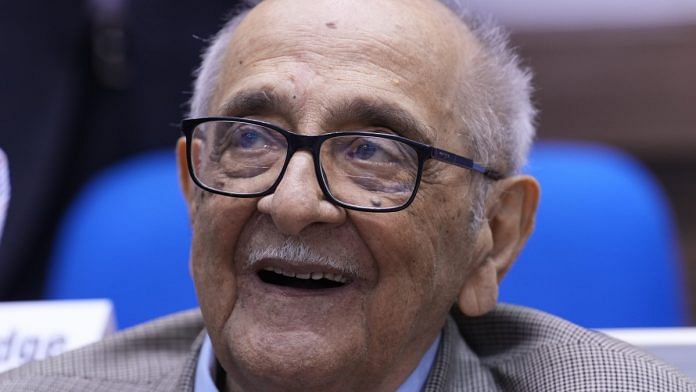New Delhi: Senior advocate and constitutional jurist Fali Sam Nariman, who had been suffering from health problems, died in Delhi Wednesday at the age of 95.
In a legal career spanning over seven decades, Nariman was a part of some of the most significant cases that shaped constitutional law in independent India. This included the three cases that established the collegium system of appointing judges — the 1993 second judges case, the 1998 third judges case, and the 2015 case against the National Judicial Appointments Commission. He was also part of the 2002 T.M.A. Pai judgment in which the Supreme Court considered the scope of the rights of minorities under the Constitution.
Nariman often stood up for the principles that form the basis of the Constitution. In 1985, he played a significant role in the Supreme Court reversing a Delhi government order that threatened to demolish the Express Building, emphasising the freedom of the press. In December 2023, taking a stand against the abrogation of Article 370 of the Constitution, he said, “…what was actually done by the Centre was, in my view, not according to the provisions of the Constitution, nor in accordance with well-settled principles of federalism.”
After the news of his death spread, Prime Minister Narendra Modi said he had been among the “most outstanding legal minds” in a condolence message on X.
Shri Fali Nariman Ji was among the most outstanding legal minds and intellectuals. He devoted his life to making justice accessible to common citizens. I am pained by his passing away. My thoughts are with his family and admirers. May his soul rest in peace.
— Narendra Modi (@narendramodi) February 21, 2024
In the Supreme Court, Chief Justice of India DY Chandrachud mourned Nariman’s death. “He was a great giant of law and an intellectual. It’s very sad,” he said.
Born in Rangoon (now Yangon) in 1929, Nariman graduated in law from the Government Law College, Bombay, in 1950. He started his law practice at the Bombay High Court right away.
He told Bar and Bench in an interview in 2010 that law was “the last option” for him. His father wanted him to take the Indian Civil Service exam. He, however, secured a second class in his BA and took up law.
He was appointed the additional solicitor general in 1972 but resigned from the post upon the declaration of the Emergency in June 1975. Years later, he wrote in an opinion piece for The Indian Express that he sent in a “one-line letter of resignation”. “There were no heroic passages in it. With the imposition of censorship, the news of my resignation was suppressed in the Indian press. But it was published in The New York Times,” he wrote.
He was also a nominated member of the Rajya Sabha from 1999 to 2005. He was awarded the Padma Bhushan in 1991 and the Padma Vibhushan in 2007.
‘Cannot be another Nariman’
Senior advocate Indira Jaising wrote on X that Nariman was “the last of a generation of lawyers from Bombay who shaped and moulded the history of constitutional law in India, a voice that stood by secular values, for the independence of the judiciary”.
Fali S Nariman Senior Advovate has passed on from this world . He was the last of a generation on lawyers from Bombay who shaped and moulded the history of constitutional law in India, a voice that stood by secular values, for the Independence of the judiciary. My deepest…
— Indira Jaising (@IJaising) February 21, 2024
Solicitor General Tushar Mehta told ThePrint that not only the legal fraternity but the nation itself has lost a towering figure of intellect and wisdom. “The country has lost an epitome of what righteousness stood for. A doyenne, paragon, and legend in his lifetime left us, with the jurisprudence enriched by his immense contribution,” he said.
Mehta recalled Nariman’s gesture of sending him all his books with his autograph and said those books “will always remain a proud possession for me and even for my next generations”.
“Sharing the homemade buttermilk I brought from home with him in the Supreme Court corridors while he regaled all of us with many past anecdotes in Gujarati is a cherished memory for me. But, he used to come (to the court) only on a few occasions in the last few years,” he said, adding that “the legal fraternity is intellectually poorer today”.
“Such intellectual giants do not die. They remain immortal through their contribution. There cannot be and will not be another Fali Nariman,” Mehta added.
(Edited by Madhurita Goswami)
Also read: Election Commission seeks Fali Nariman’s advice on fighting paid news menace



